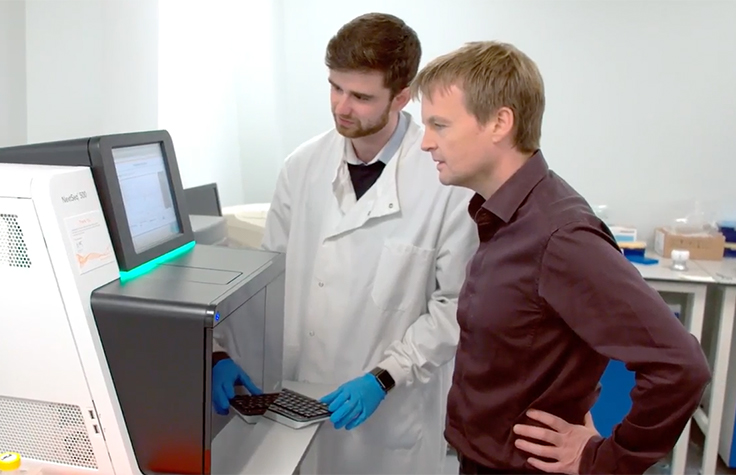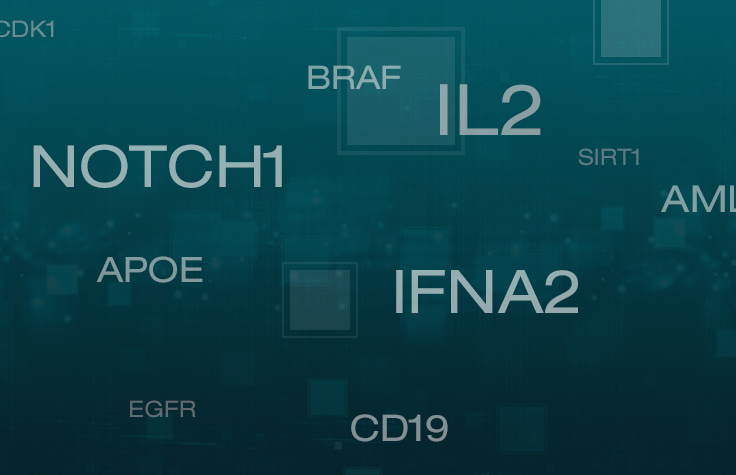神経ゲノミクス
神経科学研究におけるゲノミクス
次世代シーケンサー(NGS)やマイクロアレイなどのゲノミクステクノロジーが、アルツハイマー病、パーキンソン病、 筋萎縮性側索硬化症(ALS)、精神疾患などの複雑な神経疾患の背後にあるメカニズムを明らかにすることで、神経ゲノミクス研究を躍進させます。
遺伝性および非遺伝性の変異、エピジェネティクスおよびその他の要因間の相互作用の理解を深めるためにはNGSレベルでの解析が必要です。アレイは、神経疾患に関連する遺伝的変異の大規模な研究を促進します。イルミナは、神経ゲノミクス研究に必要となるNGSおよびアレイツールを提供しています。

神経ゲノミクスの専門家の見解
シングルセルシーケンスによるニューロンの同定解析
Dr. Bosiljka Tasicが、シングルセルmRNAシーケンスがニューロンの分類にどのように変革をもたらしているかについて論じています。
インタビューはこちら神経科学研究におけるバリアント探索のためのNGS
Dr. Franco Taroniが、ターゲットシーケンスを使用して、代謝疾患や神経疾患に関連する新しいバリアントを明らかにしています。
インタビューはこちら注目の神経ゲノミクス研究製品
- Consortia Boosters for Microarrays:神経変性疾患や精神障害の研究用に事前設計されたコンテンツなど、既存のイルミナアレイに特殊なコンテンツを追加します。
- Infinium PsychArray BeadChip:精神疾患の素因やリスクに特化した、大規模な遺伝学研究向けで、コスト効率の高い高密度マイクロアレイ。
- Infinium Global Diversity Array with Enhanced PGx:ファーマコゲノミクス研究、ポリジェニックリスクスコアの開発、遺伝性疾患研究のための、市場で最も包括的なジェノタイピングマイクロアレイ。
- Illumina DNA Prep with Enrichment: 全エクソームシーケンス、カスタムパネル、固定パネルを含む幅広いターゲットエンリッチメントアプリケーションに対応した、迅速な統合ワークフロー。
- AmpliSeq for Illumina Neurological Research Panel: このシーケンスパネルは、脳や神経系の機能に影響を与えるバリアントを保有することが知られている751の遺伝子を評価します。
- Kailos Complete Pharmacogenetic Panel:このエンリッチメントベースのターゲットシーケンス研究パネルは、約100の薬剤に対する反応に関連のある遺伝子を対象としています。
脊髄性筋萎縮症のシーケンスデータ解析
サイエンティストは、全ゲノムシーケンスデータに基づいてSMN1およびSMN2遺伝子コピー数を検出するバイオインフォマティクスツールを開発し、脊髄性筋萎縮症の研究を前進させました。
神経科学ウェビナー
幹細胞を用いた神経精神疾患における遺伝学の探求

全ゲノムまたはエクソームシーケンスを、幹細胞のRNAシーケンスおよびメチル化アレイデータに統合することで、神経疾患に関与する遺伝子やパスウェイを同定することができます。
ウェビナーを視聴する発達中のヒト皮質の空間分解能
Cedars-Sinai Medical CenterのDr. Jasmine Plummerが、シングルセルRNAシーケンスと空間キャプチャーテクノロジーを使用して、発達中のヒト胎児皮質の空間分解能を明らかにしています。
ウェビナーを視聴するファーマコゲノミクス
ヒトゲノムのバリエーションが当社の薬剤療法の奏効にどのように影響するかを理解します。ファーマコゲノミクス(PGx)研究は、最終的にはヘルスケアコストを削減すると同時に、治療計画の効果を最大化できます。
詳細はこちら
神経ゲノミクスのポッドキャスト
自閉症と精神疾患の遺伝学
Dr. Jacob Michaelson(アイオワ大学精神医学准教授)が、ゲノムと計算技術を使用して、自閉症やその他の精神疾患を研究する方法について論じています。
今すぐ聞く炎症する脳と神経炎症のゲノミクス
Dr. Michael R. Wilson(カリフォルニア大学サンフランシスコ校神経学助教授)が、ゲノミクスが脳炎症の原因をどのように解明できるかについて論じています。
今すぐ聞く認知症における大規模遺伝子リスクプロファイリング
UK Dementia Research Instituteとイルミナが主催するこのポッドキャストエピソードでは、認知症の遺伝学について専門家が議論しています。
今すぐ聞く複雑な疾患ゲノムに関するニュースレター、事例研究、最新情報をお届けします。ぜひご登録ください。電子メールアドレスを入力してください。
補足資料

Target Enrichment
Target enrichment captures genomic regions of interest by using hybridization to target-specific biotinylated probes.




